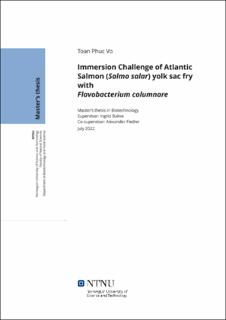| dc.description.abstract | The microbiota is regarded as an essential part for most organisms’ development and health,
especially through protection against pathogens, digestion and nutrient intake, and development
of the immune system. However, the mechanics for such interaction are not fully understood yet.
The ability of phages to infect and lyse certain target host bacteria has been used as a treatment
against pathogens as well. However, there is only a limited number of studies on the protective
effect of the microbiota against pathogens and phage therapy, and even less studies have been
conducted in these fields in regard to fish such as Salmo salar. If the potential of phage therapy
shows to be a promising tool against pathogens, it could be used as an alternative to antibiotics.
In recent years, there has been an increasing focus on the emergence of antibiotics resistant
bacteria, which pose a great threat in the medical and industrial fields of society. Gaining deeper
understanding of microbiota host interactions and phage therapy could provide tools to further
protecting animals, such as fish in aquaculture, from pathogens.
To achieve this, a reproducible immersion challenge of Atlantic salmon yolk sac fry with a
pathogen needed to be established. One of the goals of this project is to examine the pathogen
Flavobacterium columnare strains UCD Fc7 and FCO-F2 as candidates for immersion challenge
of the fry. Additionally, once an immersion challenge has been established, the potential
protective effects of the microbiota and the viability of phage therapy was tested in immersion
challenges. To examine the protective effects of the microbiota, germ-free fish and fish with a
microbiota present were immersion challenged with F. columnare Fc7 and FCO-F2, additionally
some fish were treated with FCL-2, a phage targeting F. columnare Fc7, and the mortality
between groups were compared. It was shown that conventionalized fish were noticeably more
resistant against the pathogen than germ-free fish, and that fry receiving phage treatment had
considerable increased resistance to the F. columnare Fc7 pathogen.
In conclusion, this project was successful in demonstrating the protective effects of the
microbiota against pathogens and showed that phage therapy could be a viable alternative to
antibiotics in treatment against pathogens. | |
